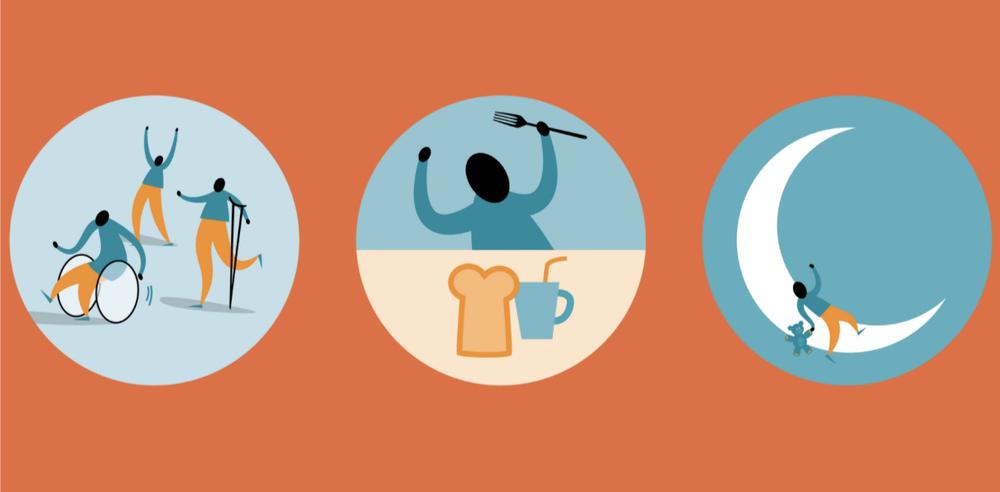Mentale gezondheid: Burn-out of bright mind? Zo blijf je mentaal sterk
Burn-out of bright mind? Zo blijf je mentaal sterk
Als student komt er veel op je af: tentamens, deadlines, een sociaal leven, bijbaantjes en misschien zelfs de vraag wat je na je studie gaat doen. Het is dan ook geen verrassing dat veel studenten last hebben van stress, onzekerheid en soms zelfs mentale gezondheidsproblemen. Daarom willen wij als studievereniging dit belangrijke onderwerp bespreekbaar maken en je wat handige tips geven om je mentale gezondheid goed te verbeteren.
Waarom hebben studenten vaak stress?
- Academische druk – Hoge verwachtingen, tentamens en last-minute deadlines kunnen best overweldigend zijn.
- Sociale media & vergelijkingsdrang – Je ziet op Instagram en TikTok hoe ‘perfect’ het leven van anderen lijkt, terwijl jij in de bieb zit te blokken.
- Financiële stress – Huur, studieboeken, boodschappen… het kan behoorlijk oplopen.
- Te veel hooi op je vork – Studeren, werken, sporten, feesten en ook nog tijd voor jezelf? Klinkt als een uitdaging.
- Eenzaamheid – Je bent misschien omringd door mensen, maar dat betekent niet altijd dat je je verbonden voelt.
Hoe zorg je goed voor je mentale gezondheid?
Gelukkig zijn er genoeg manieren om goed voor jezelf te zorgen, zodat je niet compleet overweldigd raakt. Hier zijn een paar praktische tips:
- Creëer een gezonde dagstructuur – Een chaotisch ritme is funest voor je energie en stemming. Probeer vaste tijden aan te houden voor slapen, studeren, pauzes en ontspanning. Ook al is je rooster flexibel, een ritme helpt je brein rust vinden. Sta elke dag rond dezelfde tijd op, ook in het weekend. Consistentie helpt je hoofd om helder en kalm te blijven.
- Zorg voor een gezonde levensstijl – Eet gezond, beweeg regelmatig en zorg dat je voldoende slaapt. Klinkt cliché, maar het werkt echt.
- Neem tijd voor ontspanning – Plan bewust rustmomenten in: een wandeling maken, een serie kijken of gewoon even helemaal niks doen.
- Praat erover – Of het nu met vrienden, familie of een studieadviseur is, praten helpt. Je bent echt niet de enige die hiermee worstelt.
- Stel realistische doelen – Het is oké om niet altijd perfect te presteren. Wees lief voor jezelf en gun jezelf de tijd om te groeien.
- Beperk sociale media gebruik – Minder scrollen, meer leven! Vergelijk jezelf niet continu met anderen, want iedereen heeft ups en downs.
- Zorg voor plezier – Studeren is belangrijk, maar ontspanning is dat óók. Dingen doen waar je blij van wordt, geeft je brein de ruimte om te herstellen van stress. Blokkeer in je agenda bewust tijd voor hobby’s, series, gamen, muziek of sociale momenten. Plezier is geen tijdverspilling, het is brandstof.
En het belangrijkste punt van allemaal, zoek hulp als dat nodig is
Voel je je echt niet oké? Schroom niet om hulp te zoeken. Wij, als Equilibrium, hebben een vertrouwenscontactpersoon die je kan benaderen als je ergens mee zit. Dit zijn Cheyenne Brouwer (secretaris@svequilibrium.nl) en Erwin Snakenborg (vertrouwenscontactpersoon@svequilibrium.nl). Zij staan voor jullie klaar.
Ook veel universiteiten en hogescholen bieden gratis begeleiding en hulp aan. Op de website van de Hanze staat hier veel informatie over. Zo kun je via Hanze Student Support een gesprek aanvragen met een studentendecaan of studentenpsycholoog.
Hanze Student Support
Ondersteuning van de studentenpsycholoog – De studentenpsycholoog richt zich zowel op het ondersteunen van jou in jouw persoonlijke ontwikkeling, als op het begeleiden bij mentale uitdagingen. Met als doel het voorkomen van (de verergering van) klachten en uitval, en het versterken van jouw veerkracht. De studentenpsycholoog is niet gericht op de behandeling van zwaardere (bestaande) psychische problematiek. In dit geval kan de studentenpsycholoog je eventueel adviseren contact op te nemen met de huisarts of een GGZ-instelling. Als Hanze student kun je gratis gebruik maken van de studentenpsycholoog. (Bron: MijnHanze.nl)
Ondersteuning van de studentendecaan – De studentendecaan geeft informatie en advies over onderwerpen die samenhangen met je studie of je persoonlijke omstandigheden. De decaan heeft expertise op het gebied van regelingen en procedures, studeren met een (tijdelijke) functiebeperking en personen en instanties die je verder kunnen helpen. Samen met de decaan ga je op zoek naar oplossingen binnen en buiten de Hanze. (Bron: MijnHanze.nl)
Ook biedt Hanze Student Support veel verschillende gratis cursussen, online zelfhulp modules, studiegroepen en peergroups aan. Dit gaat over studievaardigheden, welzijn, gezondheid en loopbaanontwikkeling. Ook hebben ze online zelfhulp modules voor lichte psychische klachten, leefstijlproblemen en allerlei persoonlijke omstandigheden.
Hanze Student Support is te bereiken met deze gegevens:
-
Mail: hanzestudentsupport@org.hanze.nl
-
Telefoon: 050 595 4028 (10.00-12.00 uur en 13.00-15.00 uur)
-
Kamer: B3.011, Van Olstborg, Zernikeplein 7
Hulp buiten de Hanze
Naast de Hanze is er in Groningen nog meer hulp voor studenten.
De Alles Oké? – Zo is er een supportlijn voor jongeren van de kindertelefoon, De Alles Oké? Hier kun je anoniem en gratis je verhaal kwijt, niks is te gek voor ze. Deze mensen staan klaar voor jongeren van 18 t/m 25 jaar. Elke dag zijn ze beschikbaar van 14:00-22:00. Je kunt met ze chatten via www.allesoke.nl of bellen met 0800-0450.
Ease –Ook bestaat er Ease. Deze mensen staan voor je klaar voor een gesprek als je niet lekker in je vel zit. Alles is bespreekbaar bij ze. Gesprekken zijn gratis, anoniem en een afspraak is hier ook niet nodig. Het zijn vrijwilligers die ook student zijn en precies weten waar je mee zit tot ervarinsdeskundige. Je kunt ze vinden op: https://ease.nl/.
All Ears Groningen – Als laatste is er All Ears Groningen (ook voor engels sprekende mensen). Deze mensen bieden ook een luisterend oor voor je en denken met je mee. Deze mensen hebben ook ervaring met studenten en weten veel vragen en moeilijkheden te beantwoorden. Elk gesprek is vertrouwelijk en je kunt zonder afspraak binnenlopen of bellen. Je vindt All Ears in de Van Olstborg, Zernikeplein 7/ kamer T0.011 op de Zernike Campus. Meer informatie: https://www.all-ears.nl/nl/
*Al deze info komt van https://www.mijnhanze.nl/knowledgebase-student/onderwerpen/hulp-begeleiding-of-advies-nodig/in-gesprek-over-jezelf/mentale-gezondheid?question=. Ga naar deze site van de Hanze voor meer informatie*
Jij bent niet alleen!
Het is belangrijk om te onthouden dat je niet de enige bent die hiermee worstelt. Mentale gezondheid moet bespreekbaar zijn, en wij als studievereniging willen daar ons steentje bijdragen. Dus, zorg goed voor jezelf en voor elkaar!
Heb je vragen, wil je je verhaal kwijt of zoek je hulp? Neem gerust contact met ons op of kijk welke ondersteuning jouw opleiding biedt. Samen komen we er wel!
Burnout of a Bright Mind? Here’s How to Stay Mentally Strong
As a student, there’s a lot coming at you: exams, deadlines, social life, part-time jobs — and maybe even the looming question of what comes after graduation. It’s no surprise that many students struggle with stress, self-doubt, and sometimes even mental health challenges. That’s why we, as a student association, want to break the stigma and share some useful tips to help you strengthen your mental well-being.
Why do students often feel stressed?
- Academic pressure – High expectations, exams, and last-minute deadlines can feel overwhelming.
- Social media & comparison culture – Scrolling through Instagram and TikTok, it can seem like everyone else’s life is perfect while you’re stuck studying in the library.
- Financial stress – Rent, textbooks, groceries... it all adds up.
- Too much on your plate – Studying, working, exercising, partying, and still making time for yourself? That’s a real challenge.
- Loneliness – Being surrounded by people doesn’t always mean you feel connected.
How can you take care of your mental health?
Luckily, there are plenty of ways to take good care of yourself so you don’t end up feeling completely overwhelmed. Here are a few practical tips:
- Create a healthy daily routine – A chaotic schedule can drain your energy and mood. Try to stick to regular times for sleeping, studying, breaks, and relaxation. Even if your timetable is flexible, routine helps calm your mind. Wake up around the same time every day, even on weekends. Consistency keeps your mind clear and steady.
- Maintain a healthy lifestyle – Eat nutritious food, stay active, and get enough sleep. It might sound cliché, but it really works.
- Make time to relax – Plan intentional breaks: go for a walk, watch a series, or simply do nothing for a while.
- Talk about it – Whether it’s with friends, family, or a student advisor, talking helps. You’re definitely not the only one facing these struggles.
- Set realistic goals – It’s okay not to be perfect all the time. Be kind to yourself and allow yourself the time and space to grow.
- Limit social media use – Less scrolling, more living! Don’t constantly compare yourself to others — everyone has ups and downs.
- Make room for fun – Studying is important, but so is relaxation. Doing things that bring you joy helps your brain recover from stress. Block time in your calendar for hobbies, series, gaming, music, or social hangouts. Fun isn’t a waste of time — it’s fuel.
And the most important point: Reach out for help if you need it
Not feeling okay? Don’t hesitate to ask for help. Here at Equilibrium, we have a confidential contact person you can reach out to if you need someone to talk to. You can contact Cheyenne Brouwer (secretaris@svequilibrium.nl) or Erwin Snakenborg (vertrouwenscontactpersoon@svequilibrium.nl). They are here for you.
Most universities and colleges also offer free guidance and support. At Hanze University, you can find a lot of helpful information on their website. For example, you can book a conversation with a student counselor or student psychologist through Hanze Student Support.
Hanze Student Support
Support from the student psychologist – The student psychologist is there to support your personal development and to help you cope with mental challenges. The goal is to prevent (or limit) serious issues and strengthen your resilience. The student psychologist is not intended for treating more severe psychological problems. In such cases, they can advise you to contact a GP or mental health professional. As a Hanze student, you can access the student psychologist free of charge.
(Source: MijnHanze.nl)
Support from the student counselor (decaan) – The student counselor offers information and advice on study-related and personal matters. They specialize in regulations, studying with a (temporary) disability, and connecting you to the right people or organizations. Together, you’ll look for solutions both inside and outside Hanze.
(Source: MijnHanze.nl)
Hanze Student Support also offers a wide range of free courses, online self-help modules, study groups, and peer groups. Topics include study skills, well-being, health, and career development. They even offer e-learning modules for mild mental health challenges, lifestyle concerns, and personal issues.
You can reach Hanze Student Support at:
Email: hanzestudentsupport@org.hanze.nl
Phone: 050 595 4028 (10:00–12:00 and 13:00–15:00)
Office: B3.011, Van Olstborg, Zernikeplein 7
Support outside of Hanze, in Groningen
There are also other places in Groningen where students can get help.
De Alles Oké? Support Line – This is a free and anonymous hotline where you can talk about anything, no matter how big or small. Available for young adults aged 18–25, every day from 14:00 to 22:00.
Chat via: www.allesoke.nl or call: 0800-0450.
Ease – Ease offers free, anonymous conversations if you’re not feeling your best. No appointment is needed, and you’ll be talking to volunteers, often students themselves, who understand what you’re going through.
More info: https://ease.nl/
All Ears Groningen (also for English-speaking students) – All Ears provides a confidential listening ear and thoughtful conversations about anything you’re facing. Their team has experience working with students and understands your concerns. You can visit without an appointment or call them.
You’ll find them at: Van Olstborg, Zernikeplein 7, room T0.011 on the Zernike Campus.
More info: https://www.all-ears.nl/nl/
*All this information comes from https://www.mijnhanze.nl/knowledgebase-student/onderwerpen/hulp-begeleiding-of-advies-nodig/in-gesprek-over-jezelf/mentale-gezondheid?question=. Visit this Hanze website for more information.*
You are not alone!
It’s important to remember that you’re not the only one going through this. Mental health should be an open conversation, and as a student association, we want to help create that space. So take care of yourself and each other!
If you have any questions, want to share your story, or need help, don’t hesitate to reach out to us or explore the support options offered by your program. Together, we’ve got this!
























Reacties
Log in om de reacties te lezen en te plaatsen